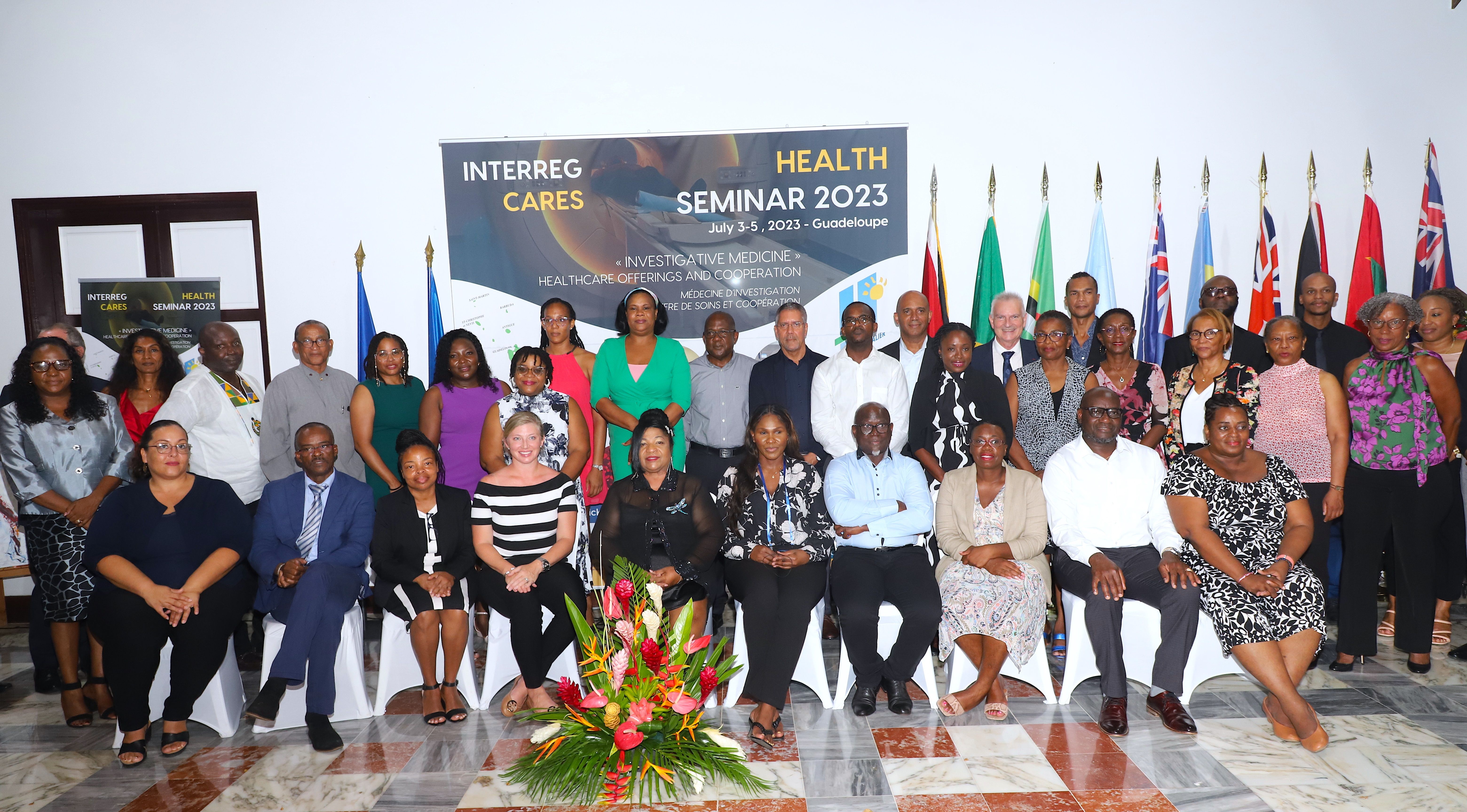OECS signs MOU to Strengthen Cooperation in Healthcare at the Seminar on Investigative Medicine in Guadeloupe
OECS Media Release
Health sector representatives across the OECS, along with a delegation from the Organisation of Eastern Caribbean States (OECS) Commission participated in a Health Seminar on Investigative Medicine in Guadeloupe from June 3-6, 2023. The seminar, which was part of the INTERREG CARES programme, was organized by the Centre Hospitalier Universitaire de Guadeloupe (CHUG) in coordination with the Regional Health Agency of Guadeloupe. As part of the event, a Memorandum of Understanding (MOU) was signed between the OECS Commission and the CHUG to increase cooperation in healthcare.
The aim of the seminar was to strengthen relations between the English-speaking OECS Member States and the CHUG, and to define a specific medical-technical care pathway for patients in the OECS. The event focused on the role of investigative medicine in the diagnosis and treatment of cancer. The participants discussed the latest developments in investigative medicine, including the use of digital pathology and the development of a cancer registry system in the OECS region.
The seminar was attended by health leaders from across the OECS region, including Hon. Ary Chalus, President of the Regional Council of Guadeloupe, and Florelle Bradamentis, Vice President of the Regional Health Agency in Guadeloupe (ARS).
OECS Director General Dr. Didacus Jules highlighted the importance of the discussions at the seminar in contributing to the strategic priorities of the OECS. According to him,
‘’Healthcare knows no borders, and by working together, we can address common challenges, share best practices, and leverage our collective resources to create a stronger and more resilient healthcare system within the region. By leveraging our collective strengths, we can enhance our healthcare systems, reduce health disparities, and ultimately improve the well-being of the OECS citizens.‘’
A side event to the seminar was the signing of a Memorandum of Understanding (MOU) between the OECS Commission and the CHUG. The MOU was signed by OECS Director General, Dr. Didacus Jules and CHUG General Director Mr. Eric Guyader. The MOU emphasizes the OECS’ commitment to regional integration and the provision of quality health services for all.
The MOU seeks to strengthen cooperation between the OECS Commission and the Centre Hospitalier Universitaire de Guadeloupe (CHUG), and to achieve the absolute priorities defined by the Heads of Government of the OECS and the Council of Ministers of Health, in their quest for health services and care for OECS citizens. The purpose of the agreement is to formalize a framework to facilitate a partnership between the OECS Commission and the University Hospital of Guadeloupe.
Dr. Jules noted the importance of the MOU towards the strengthening of cooperation between the OECS Commission and the stakeholders involved. He noted,
“The signing of this Memorandum of Understanding (MoU) represents a crucial step forward in our collective efforts to strengthen technical cooperation between the OECS Commission and the University Hospital in Guadeloupe, deepening integration between the Anglophone and Francophone OECS MS, fostering regional integration in the healthcare sector and enhance access to quality health services.”
President of the Regional Council of Guadeloupe Hon. Ary Chalus spoke to the steps required for the successful implementation of the objectives outlined in the MOU. He stated,
“ To realize these objectives, critical work needs to be done to ensure the accessibility of social security benefits in the OECS countries through adequate insurance systems. The pool of resources and the setup of the administrative coordination between insurance and health institutions is critical to ensure that patients are well taken care of.”
The General Director of the CHUG spoke with optimism about the benefits of signing the agreement. He said,
“The signature of the MoU with the OECS opens a new page in the history of the Guadeloupe hospital and will incorporate the hospital as part of the medical landscape within the region. The completion of the new hospital and the opening of the faculty of medicine at the Université des Antilles will reinforce this cooperation strategy and improve access to primary and emergency healthcare.”
As part of the seminar, OECS officials visited the CIMGUA center in Les Abymes to view the PET-SCAN machine, which can detect early-stage cancer cells and monitor the progression of the disease. They also visited the construction site for the new hospital in Les Abymes, which is scheduled to be completed in March 2024. The hospital is being built to withstand environmental shocks, including earthquakes, and will be equipped with modern, state-of-the-art medical equipment. The new hospital aims to provide better health services in the region to patients from across the OECS.


.jpeg)






.jpeg)










